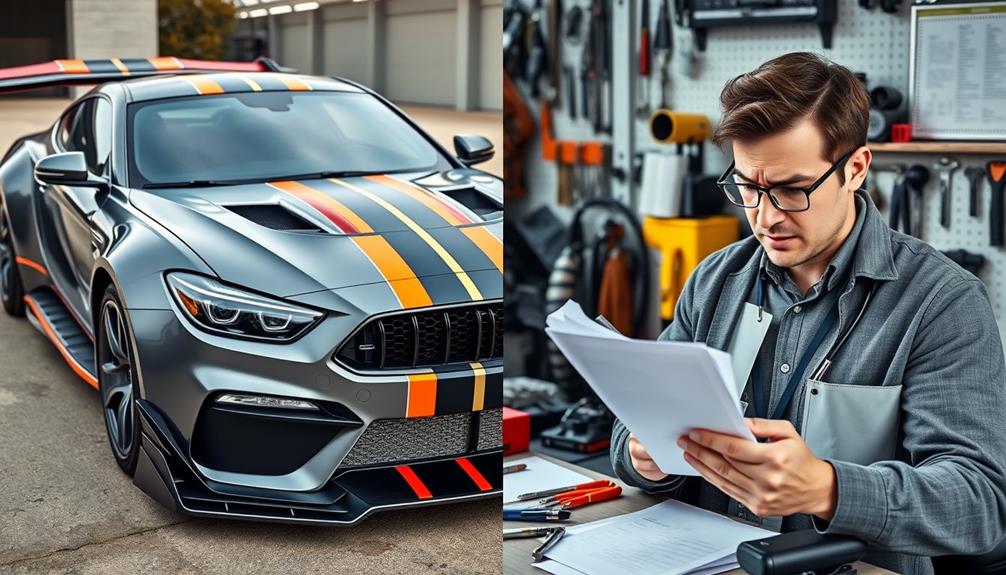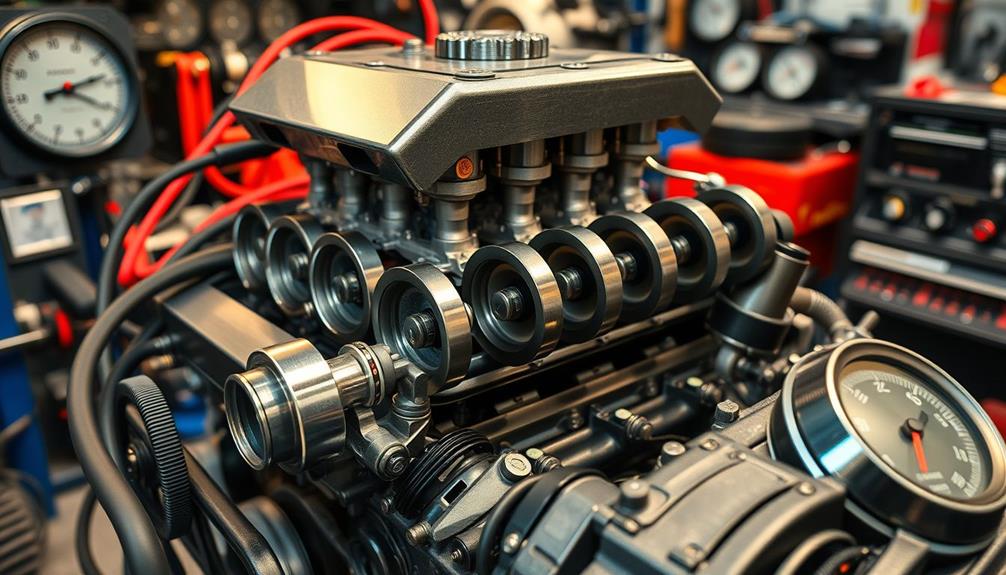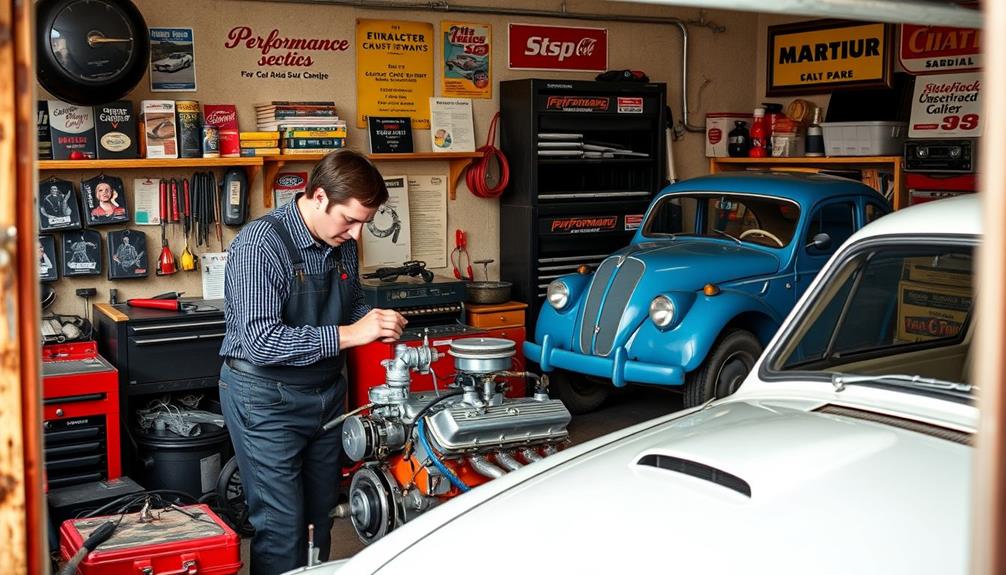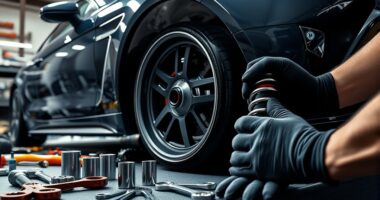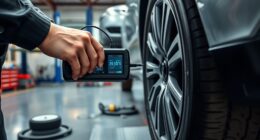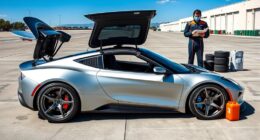Yes, car tuning can affect your insurance costs and coverage options. Performance modifications, like turbocharging, often lead to higher premiums due to increased risk. Even minor tweaks can create issues if you don't report them, possibly resulting in denied claims. Aesthetic changes may also impact your policy, especially if they boost the vehicle's value. On the flip side, adding safety features could earn you discounts. It's essential to inform your insurer about any modifications to guarantee proper coverage and avoid complications. Keep exploring to find out how to protect your newly modified ride effectively.
Key Takeaways
- Car tuning often leads to higher insurance premiums due to increased perceived risk from performance modifications.
- Failing to disclose modifications can result in denied claims or receiving only book value compensation during an incident.
- Specialized coverage options may be necessary to protect aftermarket parts and enhancements effectively.
- Safety modifications can potentially earn discounts on premiums, making them a valuable investment.
- Thorough documentation of modifications is crucial for accurate insurance assessments and claims support.
Understanding Car Modifications
Car modifications can transform your vehicle into a unique expression of your style and performance preferences. Whether you're adding a custom paint job or upgrading your engine, these modifications can considerably alter your car's original factory design.
Common types of modifications include performance upgrades like turbocharging, aesthetic enhancements such as body kits, and safety improvements like roll cages.
However, it's essential to understand that modifications can impact your vehicle's safety and compliance with local regulations. These factors may vary by location and could affect your insurance coverage. For instance, some modifications, like window tinting or suspension changes, mightn't be legal everywhere, and this could lead to changes in your insurance rates and options.
To protect yourself and guarantee you have the right coverage, keep detailed documentation of your modifications, including receipts and photos. This information is critical for insurance assessments and claims.
How Modifications Impact Insurance

Modifications can greatly influence your insurance situation, often leading to increased premiums or changes in coverage options.
When you modify your car, particularly for performance, insurance companies perceive a higher risk, which can raise your car insurance costs. Here are three key factors to take into account:
- Disclosure of Modifications: Always inform your insurer about any changes. Failure to disclose modifications can result in denied claims or even voided policies if the adjustments substantially alter your vehicle's performance or value.
- Specialized Coverage Options: Some insurance companies offer specialized coverage for modified cars, which can protect your aftermarket parts and enhancements. It's crucial to compare different policies to find the best fit for your needs.
- Impact of Safety Modifications: Curiously, safety-related modifications, like advanced security features, might qualify you for discounts on your premiums, helping counterbalance potential increases from performance mods.
Understanding how these factors affect your car insurance can help you make more informed decisions about your modified cars while ensuring you stay protected.
Types of Modifications Affecting Insurance
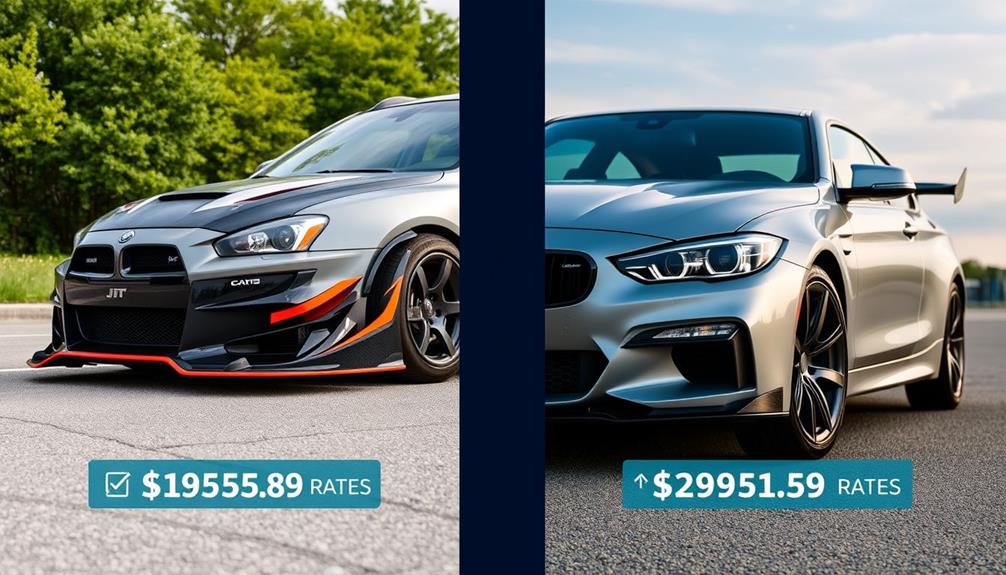
When you're considering car modifications, it's important to know how they can affect your insurance.
Performance upgrades can raise your premiums due to increased risk, while aesthetic changes might only impact coverage if they boost your car's value.
On the other hand, adding safety features could even earn you discounts, so it pays to weigh your options carefully.
Performance Modifications Impact Rates
Upgrading your vehicle can lead to surprising changes in your insurance rates. When you add performance modifications, insurers often classify your modified vehicle as higher-risk, resulting in increased insurance premiums.
Understanding your budget becomes vital in managing these potential costs. Here are three key factors that could impact your rates:
- Engine Modifications: Turbocharging, supercharging, or engine swaps can greatly enhance your vehicle's capabilities, making it more attractive to thieves and more prone to accidents, thereby raising your premiums.
- Suspension Changes: Modifications like lowering or lift kits alter your vehicle's handling characteristics. Insurers might see this as a potential safety risk, leading to higher rates.
- Upgraded Tires and Rims: These enhancements can increase the overall value of your vehicle, which may also increase your insurance costs, as the replacement value for modified vehicles is higher.
It's essential to report all performance modifications to your insurer. Failing to disclose these changes can lead to denied claims or even policy cancellations.
Always stay transparent to avoid surprises down the road.
Aesthetic Changes and Coverage
Aesthetic changes to your vehicle, like custom paint jobs or body kits, can greatly influence your insurance coverage. These aesthetic modifications can increase your car's overall value, which might lead to higher insurance premiums.
Insurance companies often view these enhancements as modifications that need to be disclosed. If you don't inform your insurer about these changes, you risk having claims denied or even facing policy cancellation.
While modifications like upgraded rims or specialized lighting mightn't greatly impact rates, insurers assess each case individually based on potential risks and costs.
It's vital to understand that failing to declare these aesthetic changes could leave you underinsured.
To guarantee your insurance covers modified vehicles accurately, document all modifications thoroughly. Keep receipts and take photographs to support your claims.
Some insurers may even offer discounts for certain safety enhancements, which can help offset costs associated with your aesthetic changes.
Safety Features and Discounts
Adding safety features to your vehicle can't only enhance your driving experience but also lead to potential discounts on your insurance premiums. When you invest in modifications that improve safety, you're likely to see a positive impact on your insurance costs.
For instance, cold medications overview can provide insights into managing various health conditions, just as safety features can manage risks on the road. Here are three modifications that can qualify you for insurance discounts:
- Rear/Front Cameras and Parking Sensors: These features minimize the risk of accidents, making your vehicle safer.
- Advanced Security Systems: Installing alarms can lower the likelihood of theft, which insurers often reward with premium reductions.
- Adaptive Headlights and Daytime Running Lamps: These improvements enhance visibility, contributing to overall road safety.
While these safety features can lead to insurance discounts, remember to notify your provider about any modifications. Insurers may require documentation to apply these discounts.
However, be cautious—some performance modifications could increase repair costs and potentially raise your insurance rates. Balancing safety enhancements with other modifications is key to ensuring you maximize your insurance benefits while keeping your vehicle safe on the road.
Insurance Discounts for Certain Modifications
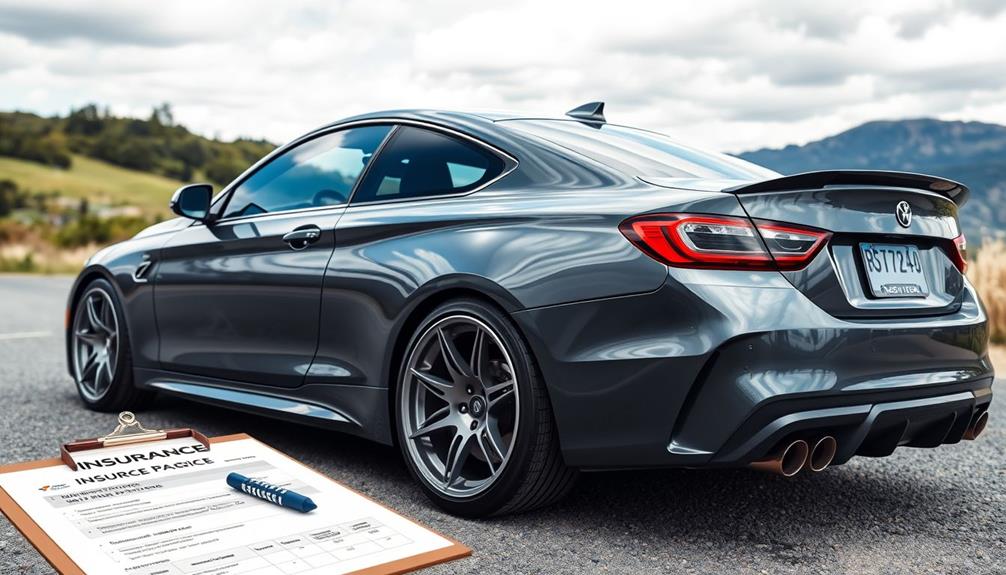
Insurance discounts can be a rewarding aspect of car tuning, especially when certain modifications enhance safety or security.
Installing security enhancements like alarms and tracking systems often leads to significant insurance discounts, as these features reduce the risk of theft. Additionally, upgrades such as rear/front cameras and parking sensors may qualify for premium reductions, since they improve safety and lower accident risks.
For example, understanding the importance of financial considerations for elderly care can provide insights into how safety modifications can also be beneficial in protecting valuable assets.
Even modifications like adaptive headlights and daytime running lamps are recognized by insurers and could contribute to your overall premium savings.
While performance modifications typically increase insurance costs, it's crucial to recognize that certain safety features can counterbalance this effect. This means that while you might be tempted to enhance your vehicle's performance, focusing on safety modifications can positively impact your insurance premiums.
Always check with your insurer about specific discounts available for modifications, as these can vary widely between providers and policies.
Understanding how these modifications can impact your insurance will help you make informed decisions while tuning your car. Car tuning refers to making adjustments or modifications to a vehicle’s engine, exhaust system, suspension, or any other component with the goal of improving performance, handling, or appearance. These modifications can often affect the car’s risk profile and could lead to changes in insurance premiums. For example, adding a turbocharger or supercharger to increase horsepower can make the car more powerful and therefore riskier to insure. It’s important to thoroughly research and understand what car tuning means for your specific vehicle and how it may impact your insurance coverage.
Ultimately, knowing which upgrades could lead to insurance discounts can save you money while keeping your vehicle safer.
Coverage Options for Modified Vehicles
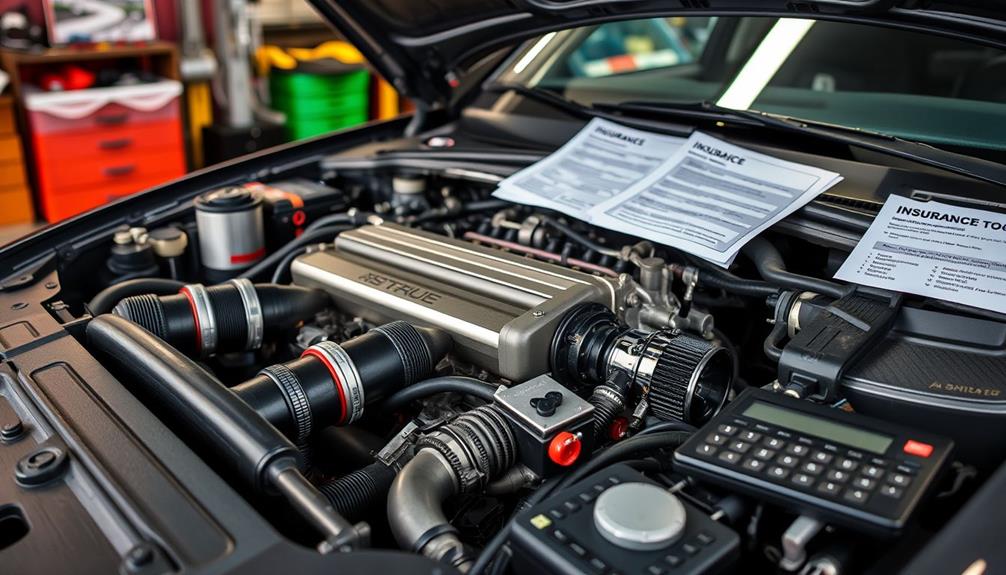
Protection is paramount when it comes to modified vehicles, as standard insurance policies often fall short of covering unique enhancements. You need to explore specific coverage options to guarantee your modifications are adequately protected.
Here are three key coverage options to evaluate:
- Supplemental Coverage or Endorsements: Many insurers offer additional policies or endorsements tailored for modified vehicles, providing extra protection beyond standard coverage.
- Stated Amount Coverage: This option is vital for modified cars. It guarantees payment for either the actual cash value or the declared value, ensuring you receive fair compensation in case of a loss.
- Classic Car Insurance: If your modified vehicle qualifies as a classic, specialized insurance can be a great fit. It often accounts for the unique enhancements and true value of your vehicle, providing thorough protection.
Understanding your insurance policy's specific terms is essential, especially regarding high-value performance modifications, as some insurers impose restrictions.
Always notify your insurance provider about any modifications to avoid denied claims or policy cancellations. By being proactive, you can secure the coverage you need for your modified vehicle.
Importance of Disclosing Modifications

Disclosing modifications is essential for safeguarding your investment and ensuring you receive proper compensation in the event of a claim. When you mod your vehicle, the value of your vehicle can greatly increase, often exceeding its book value. If you don't disclose these enhancements, you risk having your insurance claims denied or receiving only the standard book value compensation if your car is stolen or damaged.
Insurance companies typically require full disclosure of all modifications to provide appropriate coverage. If an adjuster inspects your vehicle after an accident and finds undisclosed modifications, it could negatively impact your claims processing and outcomes.
This lack of transparency can also lead to potential legal issues, as you may be deemed in violation of your insurance policy.
Being upfront about your modifications not only protects your financial interests but also fosters a better relationship with your insurance company. They'll appreciate your honesty and be more willing to help you navigate the claims process when you need it.
Ultimately, disclosing modifications is a critical step in ensuring you're adequately covered and can maximize the benefits of your investment.
Steps for Insuring a Modified Car
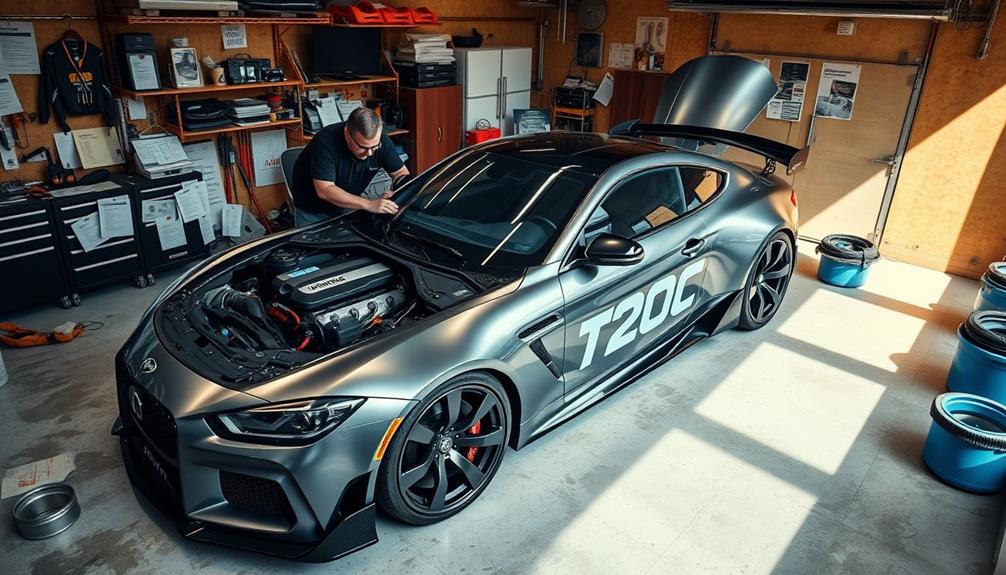
Getting your modified car insured involves a few essential steps to guarantee you have the right coverage. Here's how to navigate the process effectively:
1. Research Insurers: Look for an insurance provider that specializes in insurance for modified vehicles. Not all insurers offer this type of coverage, so it's vital to find one that understands the unique risks associated with modifications.
2. Document Modifications: Collect detailed documentation of all modifications made to your car. This should include receipts, photographs, and any relevant specifications.
Having this information on hand will help you receive accurate quotes and guarantee proper coverage assessment.
3. Notify Your Insurer: Always be transparent with your insurance company about the modifications. Notify them immediately after making any changes to your car.
This helps avoid potential coverage gaps and guarantees your policy reflects your modified vehicle accurately.
Assessing Coverage Needs Before Modding
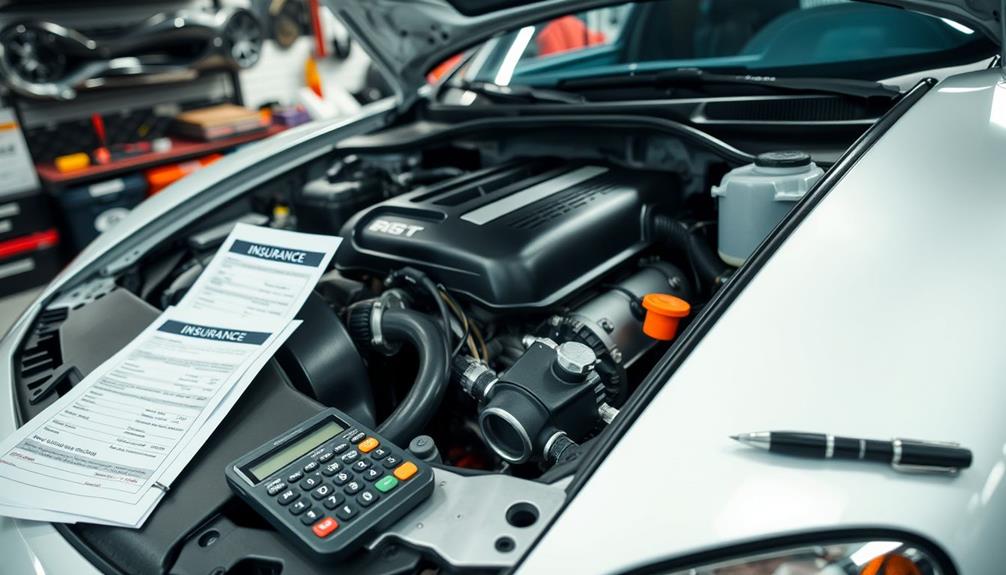
Before you plunge into modifying your car, it's important to evaluate your coverage needs with your insurance provider. Understanding how specific modifications impact your insurance is key to guarantee your vehicle maintains adequate protection.
Different insurers have varying policies regarding performance modifications, so it's smart to shop around. Not all insurers cover upgrades, and some might impose exclusions that could leave you vulnerable.
Make sure to document all modifications with receipts and photos. This documentation is significant for claims and helps your insurer understand the value of your modified vehicle.
Remember, you must notify your insurance company immediately after making any changes. Failing to do so might result in denied claims or even policy cancellations.
Consider obtaining supplemental coverage or endorsements that specifically address aftermarket modifications. This extra protection can safeguard your investment against unexpected events.
Common Misconceptions About Modifications

You might think all modifications are covered by your insurance, but that's a common myth that can lead to costly surprises.
Many drivers underestimate the impact of both performance upgrades and aesthetic changes on their coverage and premiums.
It's essential to understand that even minor modifications can affect your insurance, so staying informed is key to protecting your investment.
Coverage Myths Debunked
When it comes to car modifications, many drivers operate under a series of misconceptions that can lead to costly consequences.
It's essential to understand that making changes to your vehicle, even if they seem minor, can greatly impact your insurance coverage. Here are some coverage myths debunked:
- All Modifications Are Covered: Many believe that their insurance covers all modifications automatically. However, insurers usually require you to disclose any changes. Failing to do so can result in denied claims or even policy cancellations.
- Cosmetic Changes Are Ignored: Drivers often think custom paint jobs or other cosmetic modifications don't affect insurance rates. In reality, these adjustments can alter how insurers assess the overall risk of your vehicle.
- Minor Upgrades Don't Matter: Some assume that small performance tweaks won't influence their premiums. Yet, even basic upgrades, like turbochargers, can lead to considerable increases in rates due to perceived risks.
Being informed about these misconceptions can help you navigate the complexities of insuring your custom car effectively.
Always check with your insurer before making any modifications.
Performance Modifications Misunderstood
Modifying your car for enhanced performance can be an exciting endeavor, but many drivers overlook the potential insurance implications.
One common misconception is that minor performance modifications, like upgraded exhaust systems, don't need to be reported to your insurance company. Unfortunately, failing to disclose these changes can lead to denied claims if an accident occurs.
It's also a mistake to assume that all modifications are automatically covered under standard auto insurance policies. Many insurers require you to disclose specific upgrades, especially high-performance ones, which could greatly affect your insurance rates.
You might think that modifications aimed at improving fuel efficiency won't impact your premiums, but insurers often view any performance-enhancing change as a potential increase in risk.
Additionally, documenting your modifications with receipts and photographs is essential; this evidence can make a difference during the claims process if your vehicle is damaged.
Aesthetic Changes Ignored
Many car enthusiasts focus solely on performance upgrades, overlooking the impact of aesthetic changes on insurance coverage. You might think that minor modifications like custom paint jobs or new rims don't affect your insurance, but that's a common misconception.
These aesthetic changes ignored can greatly influence the overall value of the vehicle and lead to higher insurance premiums.
Here are three key points to take into account:
- Value Assessment: Insurers often evaluate the overall value of your modified vehicle, meaning even small aesthetic changes can raise your premiums.
- Theft Risk: Unique modifications may attract unwanted attention from thieves or vandals, which can change your risk profile and affect your insurance rates.
- Disclosure Importance: Failing to report these changes can result in denied claims or reduced compensation if an incident occurs, as insurers may view these modifications as part of the overall risk.
Don't underestimate the impact of aesthetic changes on your insurance.
It's always best to communicate with your insurance provider to guarantee you're adequately covered and avoid any surprises down the road.
Resources for Modified Car Insurance
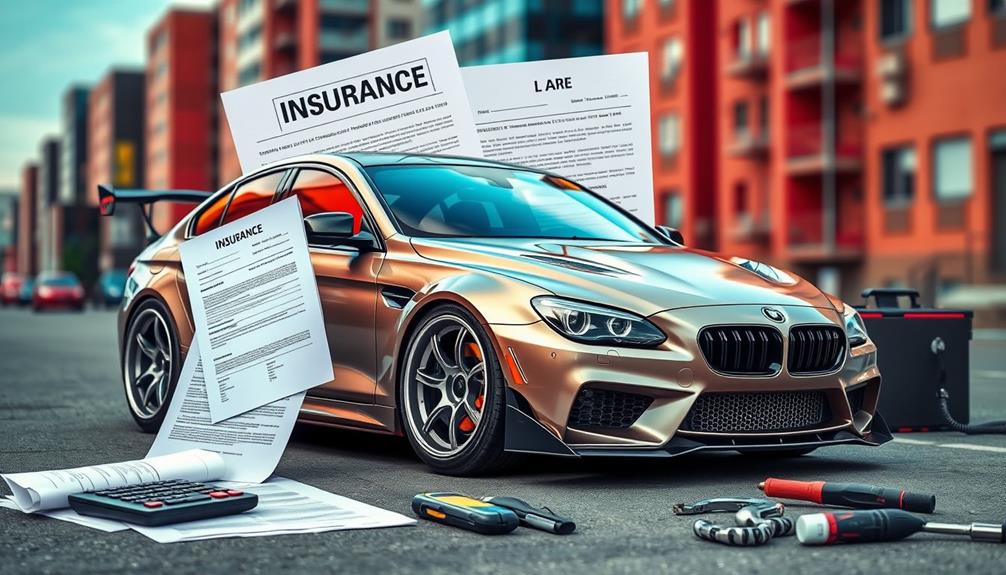
Finding the right insurance for your modified car can feel like maneuvering through a maze, but knowing where to look can simplify the process. Start by researching insurers that specialize in modified car insurance. Not all providers offer adequate coverage for aftermarket parts, so it's essential to find one that understands your needs.
Document all modifications with receipts and photos. This information is crucial for filing claims and guaranteeing you have proper coverage. Before you make any changes to your vehicle, consult with your insurance agent. They can help you understand how modifications might impact your policy and premiums.
Consider obtaining supplemental coverage or endorsements for high-value aftermarket parts that standard policies may not cover. This extra layer of protection can save you from potential losses down the road.
Lastly, review and compare multiple insurance quotes. This way, you can find the best coverage options specifically tailored for modified vehicles.
Frequently Asked Questions
Do I Need to Tell Insurance About Tuning Box?
Yes, you need to inform your insurance about a tuning box. Not disclosing it could void your coverage, leading to financial loss if something happens. Always check your insurer's specific requirements for modifications like these.
Do Insurers Check Mods?
Insurers do check mods, often using databases and inspections. While you might think keeping changes secret is smart, it could backfire. Transparency is key; it helps avoid denied claims and potential policy cancellations.
What Modifications Do I Need to Tell My Insurance Company?
You should notify your insurance company about any significant modifications. This includes engine upgrades, performance enhancements, and aesthetic changes that might boost your car's value. Always check your insurer's guidelines to guarantee compliance.
Does Tuning Your Car Ruin Warranty?
Tuning your car can indeed void your warranty if it causes damage or considerably alters factory specs. Always review your warranty terms and consult your dealer to understand what modifications are permissible without affecting coverage.
Conclusion
So, if you think slapping a giant spoiler on your car will make it fly and your insurance will just roll with it, think again. Modding your ride might boost your street cred, but it can also send your premiums soaring. Before you turn your car into a neon-lit spaceship, chat with your insurer. After all, you wouldn't want to find out too late that your "cool" modifications could leave you grounded—literally and financially!
